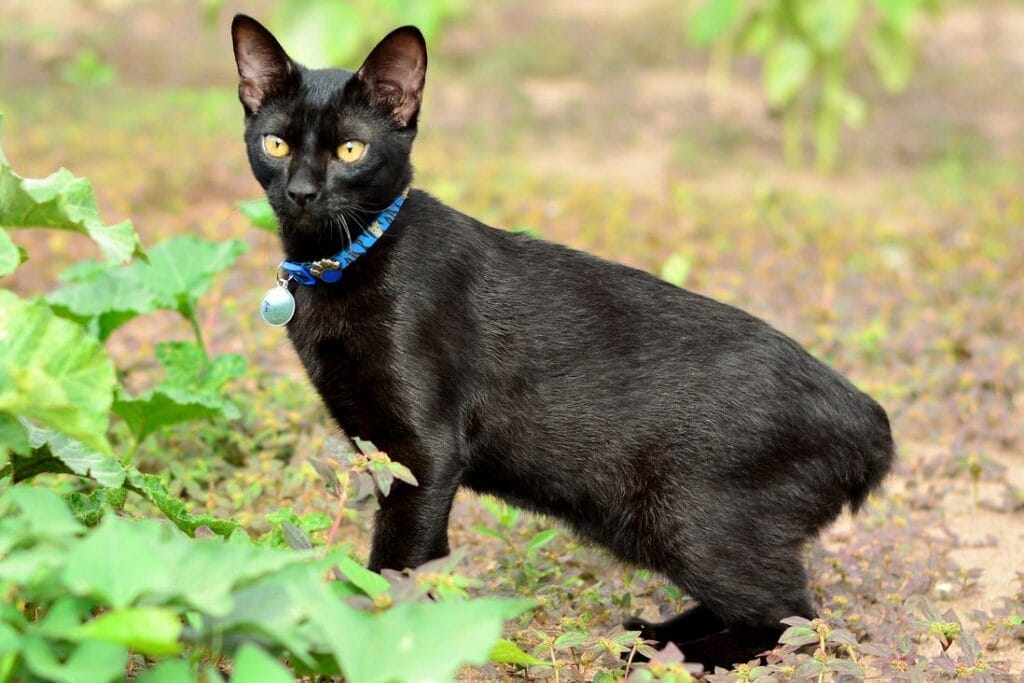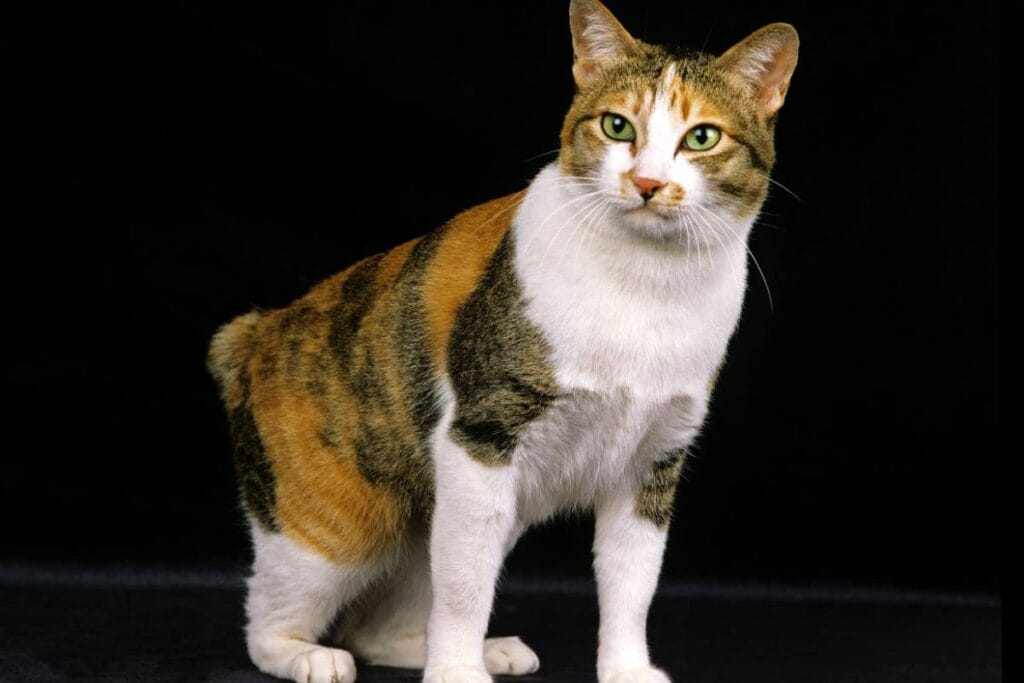The Japanese Bobtail is a unique and captivating cat breed originating from Japan. In this comprehensive guide, we will cover everything you need to know about this fascinating feline.
Introduction The Japanese Bobtail Cat Breed
The Japanese Bobtail cat breed has a long, rich history spanning over centuries in its native Japan. They are considered a national treasure and even featured in traditional Japanese folklore and art. These lively, intelligent cats first arrived in North America in the late 1960s and have steadily grown in popularity.

The Japanese Bobtail is recognized for its distinctive short, bobbed tail resembling a rabbit’s tail. The shortened tail is caused by a genetic mutation that affects tail development. Come in almost any color and pattern. They generally weigh between 6-10 pounds and live an average of 15 years.
Affectionate with Family: ⭐⭐⭐⭐
Amount of Shedding: ⭐⭐
General Health: ⭐⭐⭐⭐
Potential for Playfulness: ⭐⭐⭐⭐⭐
Tendency to Vocalize: ⭐⭐⭐
Kid-Friendly: ⭐⭐⭐⭐⭐
Friendly Toward Strangers: ⭐⭐⭐
Easy to Groom: ⭐⭐⭐⭐
Intelligence: ⭐⭐⭐⭐
Pet Friendly: ⭐⭐⭐
- Appearance: Recognized for their bobbed, bunny-like tail and wide range of color patterns. Medium-sized build.
- Characteristics: Intelligent, energetic, agile, and vocal. Devoted to their families.
- Popularity: Gaining popularity worldwide but still somewhat rare. Native to Japan.
- Temperament: Active, playful, loyal, smart, and affectionate. Good with children.
- Lifespan: Average of 15 years.
- Coat color: Any color and pattern is accepted. No point color preferences.
The Japanese Bobtail is an original, natural breed originating in Japan. Some related breeds are the Kurilian Bobtail, Mi-Ki, and American Bobtail.
How to take care of a Japanese Bobtail cat
Food:
- High-quality dry cat food to provide balanced nutrition.
- Wet food added to their diet provides extra moisture.
- Treats in moderation. Avoid people food.
Environment:
- Lots of vertical space to climb and perches to survey their domain from.
- Cat trees, shelves, and scratching posts.
- Safe outdoor access or window perches to satisfy their curiosity.
Grooming:
- Weekly brushing to remove dead hair and distribute skin oils.
- Trim nails every 2-3 weeks.
- Check ears and teeth weekly.

Take care method: Engage them mentally and physically each day through play, exercise, and interaction to prevent boredom. Cat puzzle toys provide mental stimulation.
How to buy/adopt a Japanese Bobtail cat
Locations of Japanese Bobtail cat’s popularity remains most popular in its native Japan but has devotees worldwide. In North America, Canada has the most cats registered.
Average price From a reputable breeder, expect to pay $600 to $1500 USD. Adoption fee for a rescue generally ranges $50 to $100.
Community for Japanese Bobtail cat adoption/rescue
- Japanese Bobtail Rescue (North America)
- The Japanese Bobtail Club Rescue (UK)
- Japanese Bobtail Cat Club of Australasia Rescue (Australia/NZ)
What to check before adopting/buying a Japanese Bobtail cat
- General health: Documented veterinary exam results ensure the cat is healthy.
- Vaccinate status: Should be up to date on core vaccines like rabies, feline panleukopenia, calcivirus, and rhinotracheitis.
- Medical history: Review any previous illnesses or injuries.
How to prepare for a Japanese Bobtail cat’s life
- Do ample research to understand the breed’s personality, needs, health issues, etc.
- Cat-proof your home by removing hazards and securing windows/doors.
- Stock up on basic supplies – food, water bowls, litter box, scratcher, bed, toys, brush, carrier.
- Feed high-quality food and provide fresh water daily. Give affection and playtime.
- Take new cat to the vet within first week for exam and establish veterinary record.
- Cat flap or outdoor enclosure allows safe access outside. Install shelves up high.
- Provide scratching posts. Trim nails regularly. Daily brushing recommended.
- Vaccinate against core feline illnesses. Spay/neuter by 6 months old.
- Dental issues common. Annual veterinary dental cleaning may be needed.
- Inherited heart issues seen in some lines. Buy from responsible breeder and screen for HCM.

Common name for Japanese Bobtail cat
Avoid common human names to prevent confusion during training. Use 1-2 syllable names.
Some popular names: Mochi, Yoshi, Sakura, Mimi, Yuki, Sushi
Do Japanese Bobtail cats like going out rather than staying home?
Curious, active cats that enjoy being able to explore safely outside when possible. But they are happy as long as their indoor environment is sufficiently enriching.
Is a Japanese Bobtail cat a smart cat?
Yes, highly intelligent and can readily learn tricks, play fetch, and more. Their inquisitive nature keeps them mentally engaged.
How many types of Japanese Bobtail cat are there?
There is only one recognized breed. But they display a diverse range of coat colors and patterns. No colors or patterns are considered better than others.
How to stop Japanese Bobtail cat biting?
Consistent verbal corrections, distraction with toys, and timeout if needed. Provide plenty of appropriate chew toys. Praise when they lick or nuzzle instead of biting.
How to stop Japanese Bobtail cat scratching?
Provide scratching posts around the home. Use double-sided tape on off-limit areas. Keep nails trimmed. Praise appropriate scratching.
How to do socialization and raise a friendly Japanese Bobtail cat?
Expose kitten to new sights, sounds, people, and pets in a positive way starting at 3-4 weeks old. Continued socialization throughout life prevents fearfulness.
How to train your Japanese Bobtail cat?
Use positive reinforcement like treats and praise. Be consistent. Start with basics like name, litter box, come, sit. Their intelligence allows complex trick training.
How long should we check Japanese Bobtail cat’s health with vet?
Annually is recommended, especially as a senior cat over age 7. Biannual exams provide better monitoring for chronic issues like dental disease or heart disease.
Are Japanese Bobtail cats good family pets?
Yes, thrive when raised with a family. Their affectionate, playful nature makes them an excellent choice for families with children or cat-friendly dogs.
Are Japanese Bobtail cats good with children?
Absolutely. Most cats love kids and are very gentle and tolerant of children. Proper handling should always be taught.
Are Japanese Bobtail cats good with other animals?
They generally coexist well with cat-friendly dogs. Proper introduction is key. Some do fine living with other cats, others prefer being the only cat.
Can Japanese Bobtail cats cause allergies?
While no cat is truly hypoallergenic, produces less Fel D1 protein than other cats so may provoke less allergic reaction in some.
Are Japanese Bobtail cats ferocious?
No, have a gentle temperament and are not prone to aggression. They may play a bit rough but are not ferocious.
Do Japanese Bobtail cats have much hair loss problems?
No, the short to medium length coat of the does not predispose them to excessive shedding or bald spots. Minimal grooming is required.
Are you a cat lover who wants to learn more about your furry friends? Do you want to find the best cat food, cat care tips, and resources for your cats? If so, you’ve come to the right place! Welcome to Cat Food Site, the ultimate website for cat enthusiast.
Here you will find everything you need to know about cats Breed, from their health and behavior to their breeds, cat diet and names. You will also discover the latest cat news, cat nutrition, trends, and memes from around the web.

